NISGUA continues live coverage of the trial in Guatemala of Efraín Rios Montt and Mauricio Rodríguez Sánchez for genocide and crimes against humanity.
A series of shocking events rocked the genocide trial today, including courtroom theater by the defense and legal proceedings which put the oral and public debate heard thus far at risk. The first upset came in the morning when the defense lawyers walked out of the proceedings, leaving the Efraín Ríos Montt and José Mauricio Rodríguez Sánchez without a defense. In the afternoon, an injunction hearing before Judge Patricia Carol Flores ended with a ruling that stated the public oral debate should be annulled, regressing the process to November 23, 2011.
One sign of events to come was the presence of prior lawyers involved in the defense. In addition to César Calderon, Marco Antonio Cornejo, Danilo Rodríguez and Francisco Palomo, who have had consistent presence during the trial, lawyers Luis Alfonso Gonzalez Marroquin and Moises Galindo also sat at the defense table.
The morning began with yet another procedural point on the issue of the defense witnesses. The day prior, after the defense failed to produce their witnesses for a second day, the judge requested the addresses of all the witnesses. None of these witnesses were located. The judge had also instructed the defense and prosecution to come prepared with final conclusions; presumably without any additional defense witnesses this would have been the next phase of the day’s proceedings.
Instead, the defense lawyers put their strategy into action. Defense lawyer Danilo Rodríguez began by requesting, once again, that the public debate proceedings be suspended in light of a resolution by the Constitutional Court, which was scheduled to be analyzed later that day by Judge Patricia Flores. “The present debate began without finishing the intermediate phase…Therefore, the defense of Efraín Ríos Montt request that the current debate be indefinitely suspended.”
Ríos Montt’s lawyer, César Calderon, reiterated the request, “The day we started this process we stated that there are pending injunctions and that this debate could not start. Against logic and against process the court started this hearing…We ask that the audience, at least for today, be suspended…today we will be returning to the intermediate phase.”
The judges rejected the request, stating the trial would not be suspended. “We wish to reiterate that the court has complied with resolutions emitted by the Constitutional Court…the process cannot be returned to a previous stage.” After a second request by Rodríguez, Judge Barrios reiterated the judges’ decision not to suspend the trial.
Stating that he was speaking on behalf of all the lawyers of the defense team, Calderon declared:
Since there are no further avenues to pursue and without abandoning the defense…we don’t want to participate in this illegal proceeding. We are participating in peaceful resistance in protest of the illegality of this hearing. We know of our obligations as lawyers but we will be leaving the courtroom.
At which point, all six lawyers for the defense stood up and immediately abandoned the courtroom. Family members of the defendants in the audience began clapping, while an activist threw red carnations at them, a symbol for the assassinated and disappeared.
Judge Jazmín Barrios immediately ordered court security to stop the lawyers, yelling to court officers when her microphone didn’t work, “Stop them! Stop them!” Upon hearing the judge’s order, the audience in the gallery erupted into deafening cheers and applause.
Following the failure of court security to detain the lawyers, who walked out of the courtroom unobstructed by court officers and police, Judge Barrios ordered them to return, saying, “If they want to exercise peaceful resistance, they will do it in the courtroom.”
 |
| Ríos Montt at the defense table, without his lawyers. Photo: James Rodríguez |
The prosecution lawyers subsequently made a series of requests that a defense lawyer be assigned to the defendants as their lawyers’ had abandoned the courtroom. Judge Barrios allowed time for the accused to contact their legal defense, prompting Ríos Montt’s first statement since the beginning of the trial, “The lawyers are not answering their telephones. I have another lawyer but he is involved in another case.” José Mauricio Rodriguez added, “I do not have the funds to contract another lawyer,” to which Judge Barrios replied, “We will give you time to consult your lawyers, your wife and family.”
The atmosphere in the courtroom remained electric while waiting to see if the lawyers would be returned to the courtroom. Judge Barrios eventually closed the proceedings for the day, stating “The defense lawyers are ordered to appear tomorrow morning at 8:30am. We will have to move the hearing to tomorrow because unfortunately the defense lawyers have left the accused without a defense. We are preserving the right to defense. We are not suspending the hearing, but moving it to tomorrow.”
A survivor from the Association for Justice and Reconciliation (AJR) commented on the morning’s events, “They thought that it was a simple trick, but it isn’t. They disobeyed and disrespected the judge that is in charge of this process.” Read more firsthand responses from the AJR on our blog, “AJR Survivors Respond to Dramatic Events”.
At 2pm, trial participants and observers pressed into a tiny courtroom in the upper floors of the Tribunals Tower next to the Supreme Court of Justice, which has been the scene of the daily public hearings. Witnesses, reporters, and supporters of the defendants jostled for space as they awaited Judge Carol Patricia Flores of the First Court for High Risk Crimes “A”, who had announced her intention to rule on a Constitutional Court injunction (“amparo”) previously thought to have been resolved.
While details of the legal proceedings involved are complex and will need to be confirmed by Guatemalan legal experts, in broad strokes the controversy revolves around Judge Carol Patricia Flores’ interpretation of an injunction accepted by the Constitutional Court contesting a February decision by Judge Miguel Angel Galvez to reject expert witnesses and documentation proposed by the defense team of Ríos Montt and Rodriguez Sánchez. This injunction was previously thought to have been resolved, as Judge Yazmin Barrios, overseeing the sentencing tribunal, admitted the evidence in compliance with the Constitutional Court’s ruling without suspending the proceeding. As Judge Barrios explained during the morning hearing, the defense witnesses had been permitted to testify, with some still scheduled to be heard tomorrow.
Judge Carol Patricia Flores opened the afternoon hearing with a long discussion of previous recusal motions filed at various points in the process against the presiding judges, including Judge Flores herself. These injunctions had previously been thought resolved, and their relevance to the current phase of the trial is unclear. Following this discussion, Judge Flores abruptly delivered her decision regarding the defense evidence, declaring that the admission of evidence during the sentencing phase of the trial was improper, and ordered the trial to be returned to the preliminary phase, annulling all proceedings after November 23, 2011. This would include Judge Carol Patricia Flores’ own decision, in January 2012, to formally charge Ríos Montt and Rodriguez Sánchez with genocide and crimes against humanity.
Judge Barrios formally filed a statement with Judge Flores in advance of her decision, reiterating that the court had appropriately complied with the letter of the Constitutional Court’s ruling regarding the defense injunction, and calling for the trial to resume at 8:30 tomorrow morning.
In an atmosphere of shock, confusion, and celebration by allies of the defendants, Edgar Pérez, lawyer for the AJR, protested Judge Flores’ decision, characterizing it as a grave affront to the rights of the victims stating, “Victims have waited 30 years. A fundamental right is being denied to them, the right to justice.” The prosecution accused Judge Flores of illegally exceeding her authority and declared its intent to challenge Flores’ decision. The public prosecutor commented, “This decision is a mockery of the victims and a mockery of justice.” The Attorney General’s office later reiterated the public prosecutors’ protest, releasing a statement calling Flores’ decision illegal.
Survivors from the AJR were shocked, saddened and later inspired to move forward in the aftermath of this decision.
There are people that are happy because they are against those of us who are demanding justice, but we the victims are many and we hope to see justice. Even though we have suffered setbacks, we have to continue forward. –AJR survivor
Read more AJR reactions to today’s event on our blog.

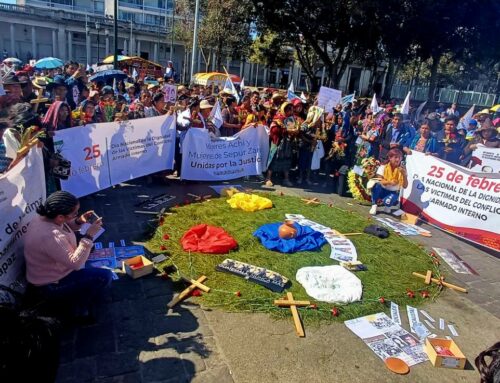
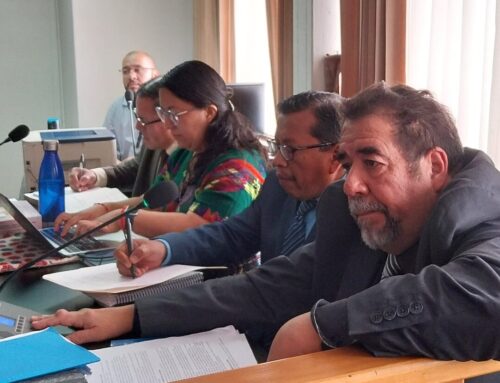
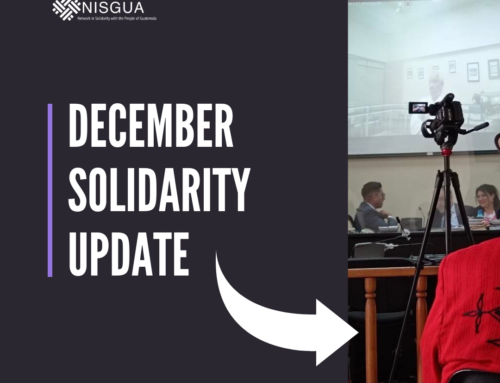
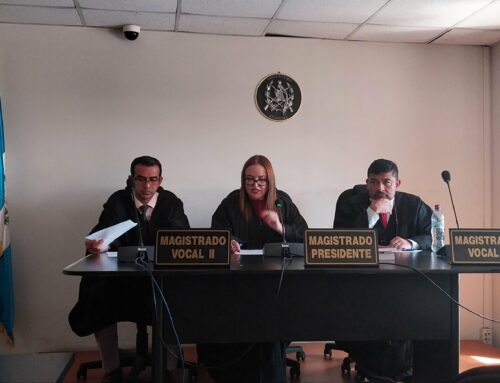
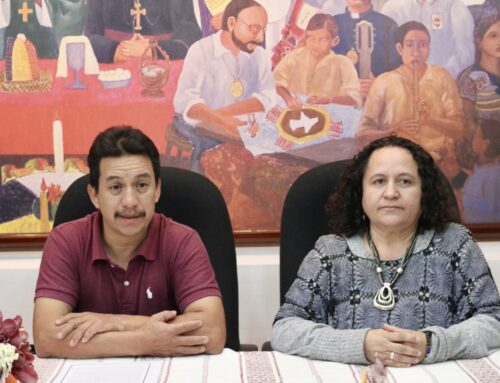
Leave A Comment